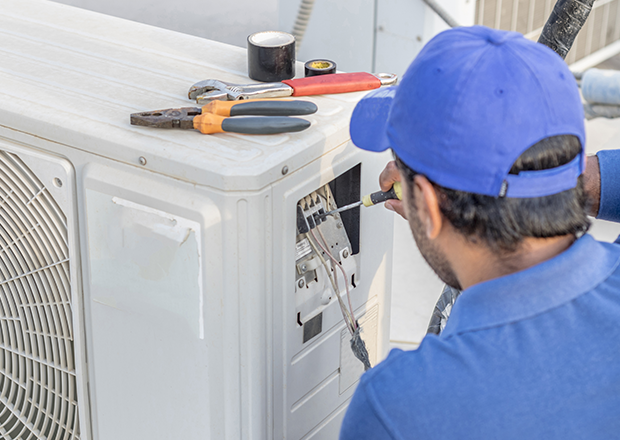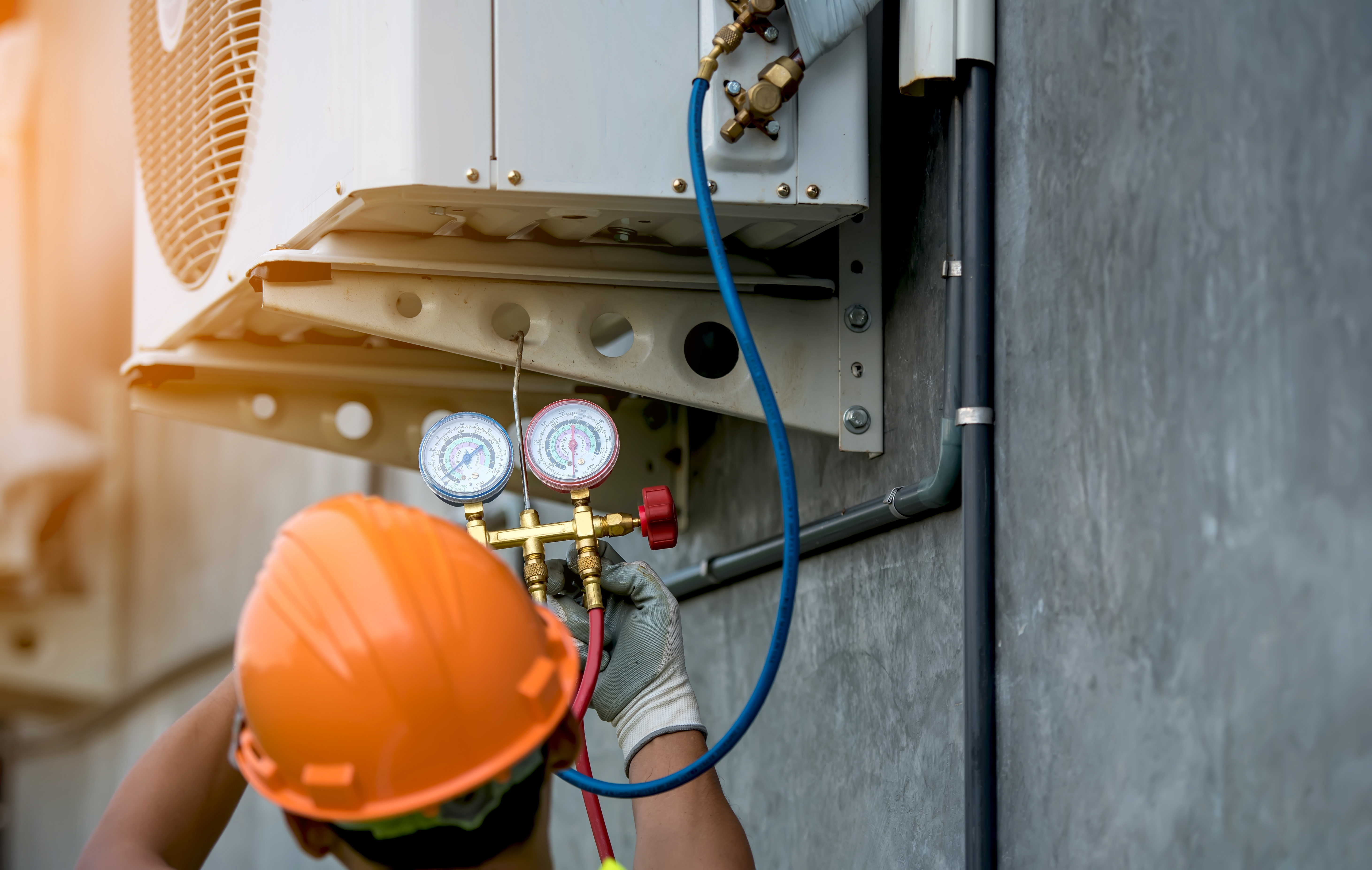The Value of Cooling And Heating Understanding: Revealing Reasons For Air Conditioning Issues for Homeowners
House owners often ignore the significance of recognizing their HVAC systems. Acknowledging usual indications of cooling troubles can lead to timely interventions. Problems like inadequate air conditioning or unusual noises are not just inconveniences; they can suggest much deeper concerns. By exploring the origin of these troubles, homeowners can improve system efficiency and expand its life-span. What are one of the most widespread concerns that can emerge, and just how can they be properly attended to?
Typical Signs of A/c Issues
Exactly how can home owners recognize problems with their cooling systems prior to they intensify? Acknowledging common signs of AC troubles is essential for prompt upkeep. One prevalent indicator is not enough air conditioning; if the a/c unit falls short to decrease the interior temperature level, it may signify underlying problems. Unusual sounds, such as grinding or hissing, can likewise indicate mechanical failings or loose parts - HVAC contractor. In addition, house owners ought to be wary of weird odors rising from the system, which could suggest mold and mildew growth or electric issues. Frequent biking on and off, referred to as brief cycling, can suggest thermostat issues or refrigerant leaks. In addition, an increase in power bills without an equivalent rise in use may direct to inefficiency. By remaining alert to these warning indicators, house owners can avoid extra significant problems and costly fixings, guaranteeing their air conditioning systems run effectively throughout the warmer months

Understanding Cooling Agent Issues
Refrigerant concerns can considerably affect the effectiveness of a heating and cooling system. Property owners should understand the indicators of reduced refrigerant levels and the relevance of identifying cooling agent leaks. Dealing with these troubles without delay can stop further damages to the system and assurance top cooling down efficiency.
Low Cooling Agent Levels
An usual problem that property owners might come across with their heating and cooling systems is low cooling agent levels, which can substantially affect the system's performance and efficiency. Cooling agent is crucial for the cooling process, absorbing warmth from indoor air and launching it outside. When levels go down, the a/c device has a hard time to cool down the area effectively, causing increased power consumption and prospective system strain. Signs of reduced refrigerant consist of inadequate air conditioning, longer run times, and ice development on the evaporator coils. Property owners might also observe unusual noises as the compressor functions harder to make up for the shortage. It is essential for property owners to recognize the significance of preserving correct refrigerant levels to assure peak HVAC performance and durability.
Refrigerant Leaks Detection
Where might a homeowner begin when confronted with the opportunity of refrigerant leakages in their HVAC system? The very first step entails monitoring the system's performance. Indications such as minimized cooling down efficiency, ice formation on coils, or hissing noises might show a cooling agent leakage. Property owners must additionally check for visible signs of oil residue, commonly a dead giveaway of a leak. Utilizing a refrigerant leak detector can supply even more precise recognition. If uncertainties continue, getting in touch with a qualified HVAC technician is important, as they possess the competence and devices to find leaks efficiently. Trigger detection and repair work of refrigerant leaks not just boost system effectiveness however likewise avoid prospective environmental harm, making it a vital aspect of heating and cooling maintenance.
Electrical Failures and Their Influence
Electric failures can considerably impact heating and cooling systems, especially through problems like circuit breaker breakdowns and damaged electrical wiring. These issues not only disrupt the system's performance yet can additionally result in expensive repair work and safety hazards. Recognizing the ramifications of such failures is essential for house owners to preserve an efficient and secure HVAC setting.
Breaker Issues
Exactly how can circuit breaker concerns impact the efficiency of a HVAC system? Circuit breakers work as vital safety gadgets that manage electric circulation to cooling and heating systems. If a breaker trips regularly, it interrupts power supply, bring about inconsistent home heating or cooling. This can trigger substantial strain on the system, causing inefficient operation and possible damage to elements. Homeowners might see enhanced power bills because of the cooling and heating system's struggle to preserve preferred temperature levels. Additionally, duplicated disturbances from tripped breakers can shorten the life-span of the AC system, calling for costly repair work or substitutes. Normal maintenance of circuit breakers is critical, as it guarantees a stable power supply, eventually boosting the total efficiency of the heating and cooling system.
Faulty Circuitry Consequences
Frequently neglected, malfunctioning circuitry can have dire consequences for heating and cooling systems. Electrical wiring concerns might bring about brief circuits, resulting in frequent break downs and enhanced repair work expenses. Additionally, incorrect electrical wiring can trigger ineffective power usage, bring about greater energy costs and pressure on the system. In extreme instances, damaged circuitry can set off electric fires, posturing a considerable safety threat to house owners. Additionally, these electric failures can damage a/c parts, leading to expensive replacements or extensive fixings. House owners ought to prioritize normal assessments by qualified specialists to determine and correct wiring issues prior to they intensify. Understanding the implications of malfunctioning electrical wiring can help ensure the longevity and safety and security of cooling and heating systems, eventually protecting both the home and its owners.
Clogged Filters and Their Repercussions
While several house owners may ignore the significance of normal filter upkeep, blocked filters can lead to significant effects for heating and cooling systems. When filters come to be obstructed with dirt, dust, and debris, air movement is restricted. This decrease in air movement requires the system to function harder, leading to boosted energy usage and possibly higher energy costs. In time, this pressure can cause deterioration on parts, resulting in premature system failing.
Additionally, stopped up my response filters can jeopardize interior air top quality. Pollutants and allergens might flow throughout the home, aggravating respiratory problems and allergic reactions for occupants. Insufficient air flow can create the evaporator coil to ice up, leading to pricey repairs and inefficient cooling performance. Routinely altering or cleaning up filters is a basic yet crucial upkeep job that can help guarantee the longevity and efficiency of a/c systems, eventually profiting both the house owner's convenience and their funds.

Thermostat Malfunctions Discussed
What takes place when a thermostat malfunctions can greatly affect both comfort and power efficiency in a home (HVAC company). A malfunctioning thermostat may stop working to accurately check out the temperature level, resulting in overcooling or not enough cooling. This inconsistency can create discomfort for owners and lead to higher energy costs, as the heating and cooling system functions more difficult than essential
Common problems consist of dead batteries, which can render digital thermostats faulty, and loose electrical wiring that interferes with communication between the thermostat and the heating and cooling device. Additionally, out-of-date or inadequately calibrated thermostats might not respond properly to temperature level changes, better intensifying power inadequacy.
Homeowners must be cautious for indications of breakdown, such as inconsistent temperature levels or unanticipated energy prices. Routine checks and understanding of the thermostat's performance can help recognize troubles early, guaranteeing peak performance of the cooling and heating system. Dealing with thermostat issues quickly is important for maintaining a comfortable living environment and managing power intake effectively.
The Role of Regular Maintenance
Regular upkeep plays an important role in ensuring the longevity and efficiency of HVAC systems. Homeowners who focus on regular checks can stop small problems from intensifying into costly repairs. Regular upkeep commonly consists of tasks such as cleaning up filters, examining ductwork, and checking cooling agent degrees. These activities help maintain ideal air movement and system efficiency, minimizing energy consumption.
A well-maintained Cooling and heating system runs much more successfully, supplying constant comfort throughout the home. Routine tune-ups can likewise extend the life expectancy of the unit, bring about considerable savings gradually. House owners are motivated to schedule specialist examinations at the very least yearly to recognize prospective troubles early.
In addition, numerous manufacturers call for regular upkeep to copyright service warranties, making this practice not only beneficial however usually required. On the whole, understanding the importance of routine upkeep encourages he said property owners to guard their heating and cooling systems versus unanticipated failures and improve their investment in home comfort.
Frequently Asked Concerns
Just How Can I Enhance My Air conditioner's Power Performance?
Improving an air conditioning's power performance entails regular upkeep, cleansing or changing filters, securing ductwork, ensuring proper insulation, utilizing programmable thermostats, and organizing expert assessments to recognize and remedy possible problems affecting performance.
What Is the Life expectancy of a Normal A/c System?
A common air conditioning device has a life-span of 15 to twenty years, depending upon maintenance, use, and ecological aspects. Routine upkeep can substantially expand its operational life and enhance total effectiveness.
When Should I Replace My Cooling System?
An a/c system ought to generally be changed every 10 to 15 years. Indications for replacement consist of regular repairs, climbing energy costs, and not enough cooling, indicating that an upgrade might be much more cost-efficient and reliable.
Can I Fix Air Conditioner Problems Myself?
Yes, individuals can repair a/c troubles themselves by examining filters, making sure power supply, and examining for visible issues (HVAC contractor). However, complex issues often need specialist assistance for precise diagnosis and secure repair, making certain perfect system efficiency
Just how Do I Choose a Trusted HVAC Professional?

To select a dependable cooling and heating specialist, one should seek recommendations, inspect on the internet evaluations, confirm licenses and insurance coverage, examine experience, and demand thorough price quotes to assure top quality solution and fair prices prior to choosing.
Final thought
To sum up, a solid understanding of heating and cooling systems allows property owners to efficiently diagnose and address common cooling concerns. Acknowledging indications such as inadequate air conditioning or climbing power costs allows for timely interventions, which can greatly improve system effectiveness and longevity. By remaining informed here are the findings regarding potential issues like refrigerant leakages, electric failures, and clogged up filters, home owners can take positive actions to keep their systems, eventually guaranteeing convenience and advertising a much healthier living environment. Normal upkeep remains vital to this undertaking.